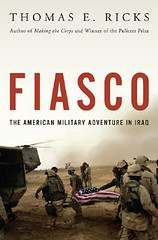In today's Fresh Air broadcast, Terry Gross interviewed Thomas Ricks. He wrote the bestselling book, Fiasco: The American Military Adventure in Iraq. As always, Terry found the interesting gay angle to the interview and asked Ricks about Don't Ask, Don't Tell. Ricks argued strongly against DADT and made some excellent points:(emphasis added):
THOMAS RICKS: . . . My concern is this, the best way to counter a roadside bomb – and that’s the thing that causes most of our casualties in Iraq – the best way to counter a roadside bomb is not some high technology, electronic jammer, or overhead aircraft. The best way to counter a bomb is to speak Arabic – to be able to listen to people. Maybe they say it directly to you. Maybe they say it to each other as you’re walking by. Maybe they say, “Boy, those troops are headed straight for that bomb that guy just planted”. It would be nice to be able to hear that. Well, American troops don’t speak Arabic. By kicking out people who speak Arabic, I think that some American casualties have directly resulted from that action. If we have more people on the ground who speak Arabic, you are going to save more American lives.
The second thing that really bothers me about this is that you hear people say, “Maybe we should change the policy, but it’s the wrong time to change the policy. You don’t change the policy in the middle of a war.” Well, that’s just historically ignorant. The times when US policies change tend to be in the middle of a war when manpower is most needed. So, for example, it was during the Korean War under Harry Truman when you had large scale integration of black troops into – out of segregated units in – across the army. And everybody now agrees that that was the right thing to do. It’s war time when policies tend to change – when you tend to get the most radical shifts in how we view gender, sexuality, and racial issues in the military. . .
Terry Gross also had a short interview with Stephen Benjamin, a Arabic translator that was dismissed for being gay.
Benjamin was raised in a conservative evangelical family and believed that he could change his sexual orientation. He was not out before he joined the military and he had to quickly tell his parents that he was gay and being dismissed from the military before the media coverage.
TERRY GROSS: Why did you feel like you couldn’t tell them [your parents] before?
STEPHEN BENJAMIN: I grew-up as a conservative evangelical – my parents are as well. So, I was told my whole life that being gay was wrong and I struggled with that for a long time. Especially when they tell you that you can change. And, uh, a decade later I realized that’s not going to happen. But it was still difficult to tell them because I knew what they believed and I really didn’t want to challenge their beliefs. It took me a long time to realize who I was. I didn’t even want to think about what it would take or what they would be feeling when I told them.
It sounds like Benjamin is referring to Exodus or one of the ex-gay ad campaigns. Could Benjamin be a ex-gay survivor too?
Benjamin has catapulted from the military closet into the national DADT debate with his New York Times Op-Ed and an appearance on the Colbert Report. I don't envy his pretend sparring with Stephen Colbert:

1 comment:
thanks for stopping by! I responded to your comments on my site. :) By the way I love portland!
Post a Comment